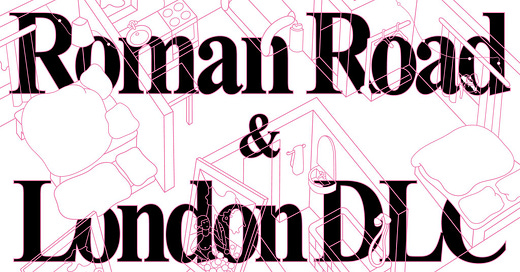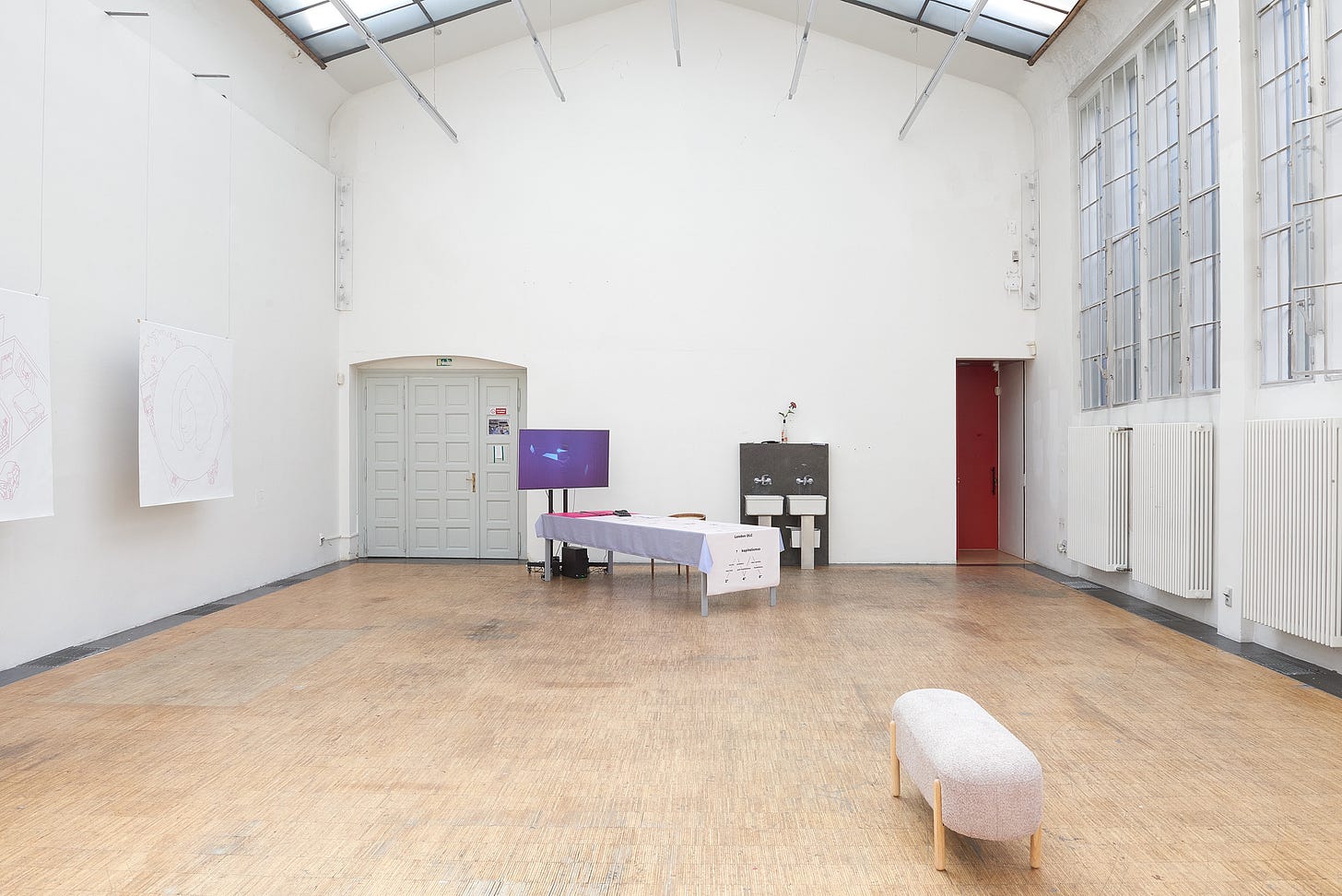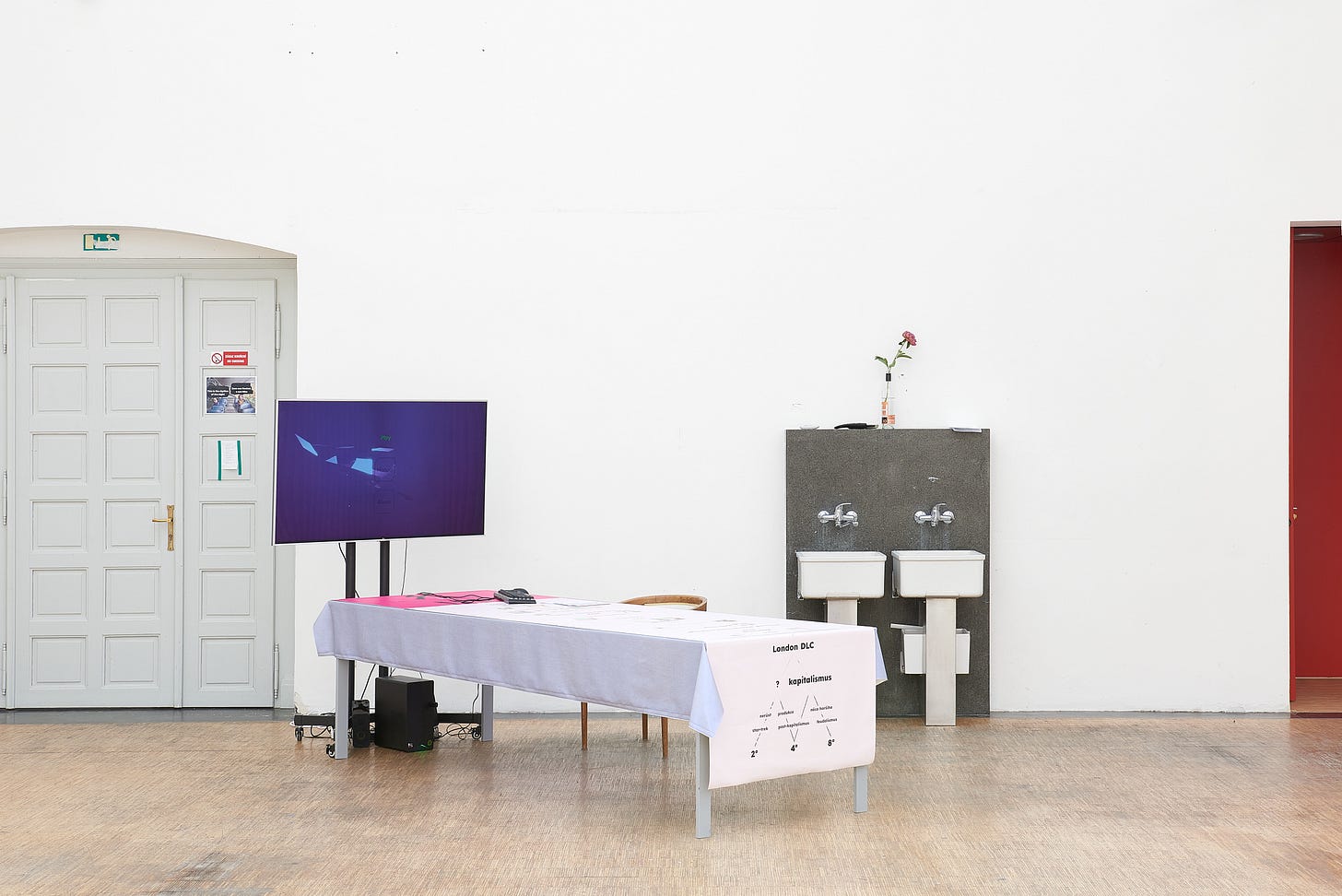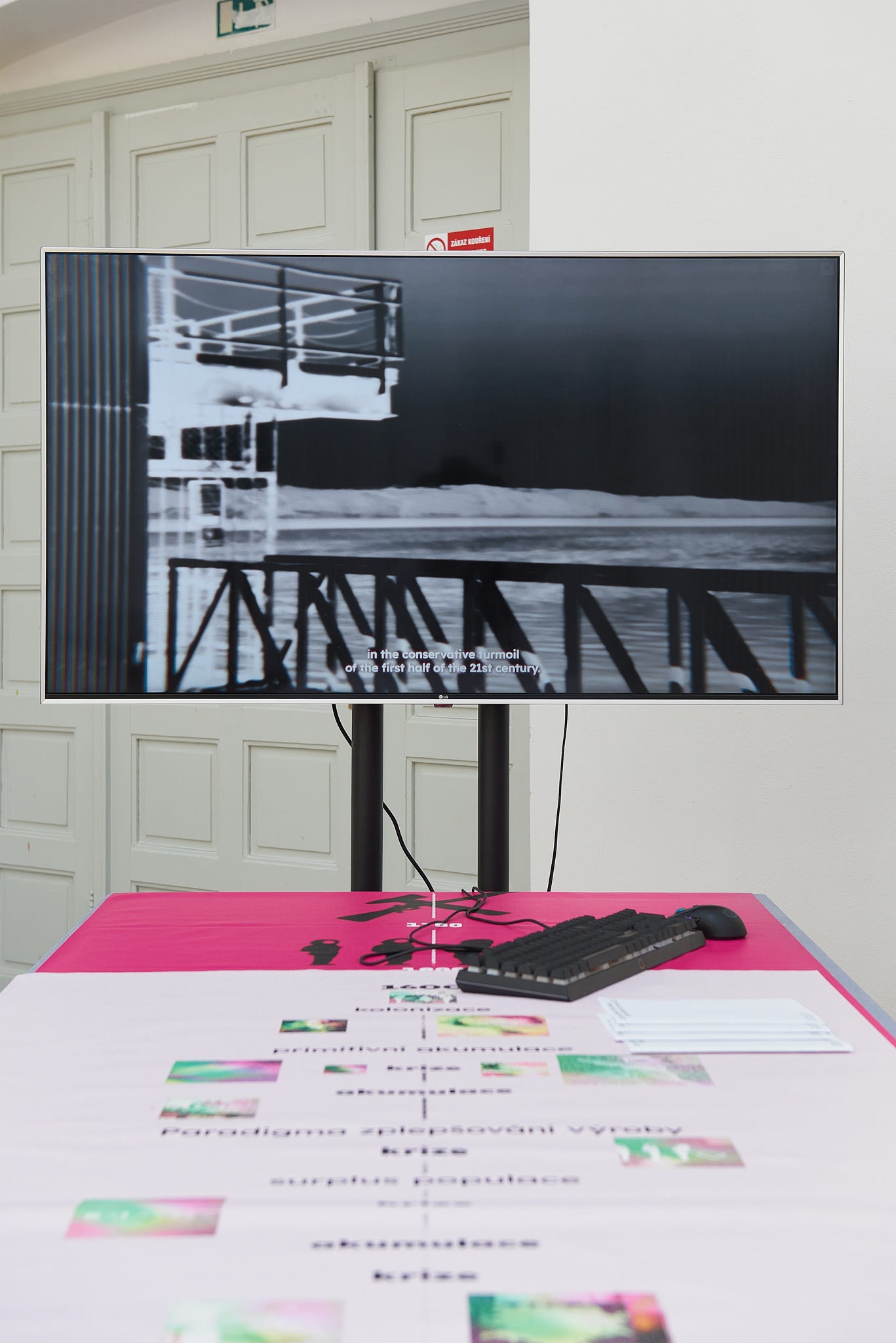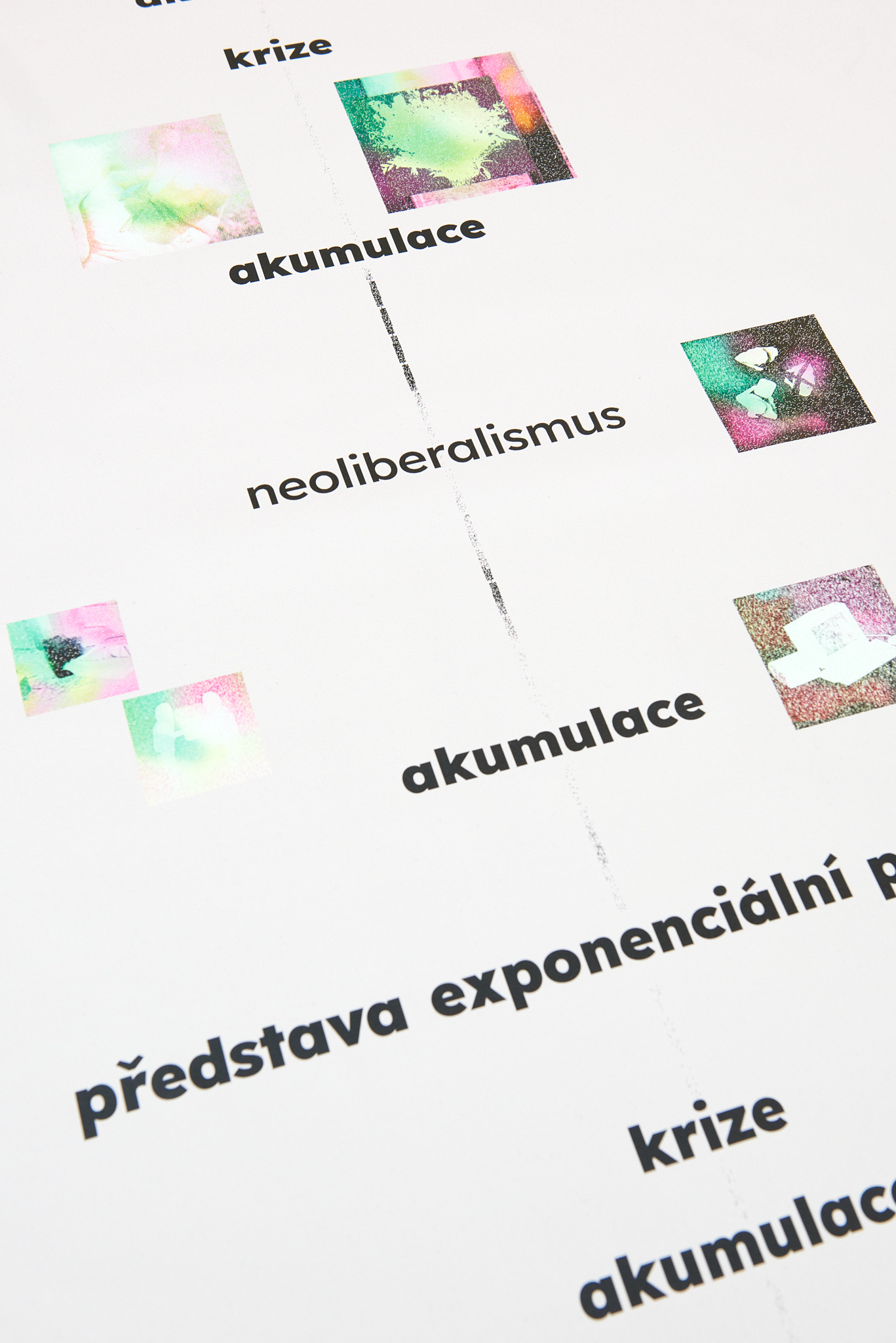Gauče, zpackané utopie a stíny na zdi / Sofas, botched utopias and shadows on the wall
Zuzana Jírová & Filip Hauer: Roman Road & London DLC (text k výstavě / exhibition text)
↓Scroll down for English
Výstava je k vidění ještě do 14. 7. na adrese Šalounův Ateliér, Slovenská 4, Praha 10 → víc informací (FB event) // The exhibition is open until 14. 7. 2024 at Šalounův Ateliér, Slovenská 4, Praha 10
Gauče, zpackané utopie a stíny na zdi
Zalívám matcha čaj s adaptogenními houbami. Už mi nejde jen o bdělost, ale taky všechny další efekty, které obal s trendy futuristickým designem slibuje. Klid. Nižší úzkost. Lepší metabolismus. Šlehám (ovesné) mléko a na stole mě čeká lahvička s ashwagandhou. Kolik energie mi asi přidá, než se vydám do knihovny číst další knížky o kritické teorii? Na rozdíl od výstavy Roman Road & London DLC ale v tomhle světě musím zítra do práce. S porcí nootropik a nejistotou, jestli znovu a znovu volím kariéru správně.
Co spojuje ilustraci s videohrou? Strasti výměnné studentky v Londýně a dějiny kapitalismu? Filip se Zuzanou možná volí jiná média, ale každý svými prostředky popisují realitu, ve které jsou pravidla úspěchu překrytá neprůhlednou sítí mocenských vztahů. Ať máte v kapse pár stovek liber ze stipendia, nebo dostáváte nepodmíněný základní příjem, ale školy a nemocnice okolo postupně zavírá konzervativní vláda.
Na Roman Road & London DLC se tenhle zájem o politiku každodennosti projevuje na mikro i makroúrovni. Zatímco dějinný kontext dodávají tisky na stole, důsledky kolonialismu, primitivní akumulace, dramatického přechodu od feudalismu k industriálnímu kapitalismu a ještě dál jsou cítit jak v životech postav ve Workers Out of Office, tak mezi růžovými linkami The Roman Road.
Zuzana i Filip zpřítomňují ty silné i drobné záchvěvy, s nimiž každý den cítíme přítomnost politiky a ekonomie. Kate přemítá o tom, jestli si někdo koupí její obraz, zatímco si přivydělává pronajímáním bytu přes airbnb. Postavy ve Filipově videohře možná nemusí řešit to nejzákladnější existenční minimum, ale prekarizované jsou podobně – zvlášť, když se mezi herní budoucností a komiksovou současností výrobní vztahy zas tak nezměnily.
McKenzie Wark ve vlivné knížce Gamer Theory mluví o figuře Jeskyně. Platónský koncept aplikuje na pomyslné hráčské doupě, jen místo stínů idejí jsou to videohry, které v čisté formě zpřítomňují fakt, že i samotná skutečnost tam venku víc a víc připomíná videohru – digitalizovaný kapitalismus, v němž jsou pravidla úspěchu dílem náhodná stejně jako neprůhledná. Co včera byly znaky tak, jak je chápe teorie vizuální kultury, jsou dnes součástky algoritmické reality, která neúprosně převádí spojitý svět na jedničky a nuly.
Podle Wark je to, paradoxně, právě Jeskyně, v níž leží klíč ke kreativnímu převracení skutečnosti. Je to místo, kde si lze s alegoriemi vnějšku zahrávat, zkoumat je, abychom se pak vrátili na sluncem zalitý povrch vybaveni novým kritickým poznáním.
Když usedám na křeslo, sleduju sekvenci ilustrací na televizi, držím v ruce myš a zkoumám ekofeminismus, napadá mě, jestli Galerie neskrývá podobný příslib. A zda Filip se Zuzanou nejsou buďto archeologové nebo průvodci podzemním komplexem, v němž po vlhkých zdech stékají kapky futuristické spekulace, podlaha zarůstá mechem opatrné utopie a v dálce zní ozvěny praskajících bublinek koupelové pěny z Marks & Spencer.
Ilustrace i videohra jsou různé způsoby ohledávání současnosti. V případě Zuzany intimní portrét života mezi mlýnskými kameny trhu s uměním, patriarchátu, vztahů a osobních ambicí. Přívětivá barevná paleta i přítomnost měkkého nábytku je kontrapunktem k podprahové drásavosti, která je mezi postupně se vyměňujícími obrazy cítit.
Filip pak tady a teď Zuzaniny pokojové etudy protahuje přes horizont budoucnosti. Algoritmická povaha jeho práce zpřítomňuje každodenní nutnost volit. Mezi typem stimulantu (dopoledne kafe, odpoledne cordyceps, večer vitamín D), mezi krátkodobými úvazky, mezi odpočinkem, úklidem a politickou prací. Při prvním pohledu na svět s nepodmíněným příjmem se mi chtělo Anně a Cho závidět. Stačí ale chvíli hrát a o slovo se přihlásí všechny možné síly odkrajující z příslibu emancipace další a další části.
Nakonec i samotná Zuzana se v časové smyčce v herní podobě vrací. Mluví s námi z roku 2040, ale zmiňuje dobře známé problémy umělecké kariéry: nedostatek sociálního kapitálu, napětí mezi prací a vztahy, námezdní práci přes fiktivní aplikaci Dixon Local Couriers.
Workers Out of Office skrze prostor herních možností vede hráčstvo k reflexi stávající ideologické situace a představuje laboratoř novodobé politické subjektivity (včetně možnosti být poslušným neoliberálem). Zároveň ale naléhavě připomíná, že utopii nejde vybudovat prostým technokratickým řešením – a že i ta nejlepší myšlenka může být snadno kooptovaná těmi, kteří na ní chtějí zase jen a co nejvíc vydělat.
Galerie je Jeskyně možná taky proto, že představuje čas a prostor částečně oddělený od světa tam venku. Ne snad, že by byla nějakým svobodným hřištěm (naprostá svoboda neexistuje) nebo magickou zahradou mimo tlaky skutečnosti (naopak – přímo z nich vyrůstá). Ale i tak se za zdmi galerie mohou dít věci, díky kterým se pak na svět venku podíváme novýma očima. Ilustrátorka se stává postavou ve hře, hra proměňuje kontext ilustrace, zatímco okolo běží dějiny vykořisťování.
Kromě politiky na osobní i systémové úrovni tak Roman Road & London DLC připomíná, že jakýkoliv nový, kritický pohled, bude muset vzít v úvahu (post)koloniální situaci. Ta je vidět nejen v pohledu na dějiny výrobních vztahů a na ně navázaného násilí, ale v každodenních konverzacích.
"Kdo ale bude sbírat naše jahody?" ptá se dvojice můžu s kravatami v bytě dvou umělkyň. Průpovídka, která, pronesená z imperiálního centra, zní obzvlášť zlomyslně. Chtělo by se je za jejich přezíravost vykopnout ze dveří. Jenže právě na prahu začínají pravidla hry: co když jsou to sběratelé umění?
Nikdy si nemůžeme být jistí.
Ani v tom, jestli adaptogenní houby skutečně fungují, nebo jestli je to jen nejnovější fabulace trhu se zdravím, který nám prodává berličky, abychom mohli zítra znova s úsměvem vyrazit do práce.
Možná ale není vše ztraceno.
Možná jde Jeskyni opustit a skrz plátno každodennosti zahlédnout obrysy rodící se budoucnosti.
Sofas, botched utopias and shadows on the wall
I’m brewing matcha tea with adaptogenic mushrooms. I no longer care only about being awake, but I want all the other effects that the trendy futuristic packaging promises. Calmness. Lower anxiety. Better metabolism. I’m whipping the (oat) milk. There’s a bottle of ashwagandha waiting for me on my table. How much energy will I get from it, before I depart for the library to read more books about critical theory? But what’s different from the exhibition Roman Road & London DLC, in this world, I have to go to work tomorrow. With a handful of nootropics and uncertainty. Because, while I’m choosing my career path again and again, I am not sure if I'm making the right call.
What does illustration have in common with a videogame? And where the hardships of an exchange student in London intersect with the whole history of capitalism? Filip and Zuzana might choose different media, but each in their own way describe reality, where an opaque web of power relations obfuscates the conditions of success. You might have a few hundred pounds from the stipend in your pocket or you might be receiving an universal basic income. But schools and hospitals around you are still being shut down by a conservative government, one by one.
The Roman Road & London DLC tackles the politics of everyday life on both macro and micro scales. Prints on the table give the needed historical contexts, depicting aftermath of colonialism, primitive accumulation and dramatic shift from feudalism to industrial capitalism. But all of these are further noticeable in the lives of characters from Workers Out of Office as well as among the pink lines of The Roman Road.
Zuzana and Filip make apparent those both strong and minutiae quivers that make the presence of politics and economics felt in our lives every day. Kate ponders if somebody will buy her painting at last, making ends meet via Airbnb. Characters in Filip’s videogame don’t have to deal with the bare minimum of material existence, but their lives are precarious nevertheless – especially when the relations of production are surprisingly alike in the game future and they are in the comic present.
In her influential book Gamer Theory, McKenzie Wark talks about the figure of The Cave. She applies the platonic concept on the (both imaginary and real) gamer’s den. Only instead of the shadows of ideas, it’s videogames. In the purest form, they make apparent the fact that the outside reality itself is more and more akin to a kind of videogame – digitized capitalism where the rules you need to follow to succeed are just as random as they are unclear. What yesterday were signs, as understood by the visual culture theory, today became components of the algorithmic reality that relentlessly turns continuous world into zeroes and ones.
According to Wark, it is paradoxically a cave where the key needed for creative subversion of reality is hidden. It is a place where we can trifle with the allegories of the outside and examine them. Only then can we return back onto the sun-soaked surface, equipped with a new critical knowledge.
I’m settling down on the couch. I’m watching a sequence of illustrations on the television; I’m holding a mouse in my hand and researching ecofeminism. And I am thinking if a gallery can contain a similar promise. And whether Filip and Zuzana could be either archeologists or guides in this underground complex – where drops of the futuristic speculation trickle down along damp walls, the floor is getting overgrown by the moss of a cautious utopia and where popping of bubbles released from a Marks & Spencer bath foam can be heard in the distance.
Illustration and a videogame are different means of examining the present. In the case of Zuzana, it’s an intimate portrait of a life amidst pressures of the art market, patriarchy, relationships and personal ambitions. A contrast between the inviting color palette, the cozy furniture and the subliminal uneasiness that is felt underneath the changing images.
Filip takes the here and now of Zuzana’s room vignette and stretches it over the horizon of the future. The algorithmic character of his work makes felt the everyday need to choose. Between the type of stimulant (coffee in the morning, cordyceps in the afternoon, vitamin D when the sun goes down) or short-term employment contracts, between rest, chores and political work. When I first laid my eyes on the world where the universal basic income exists, I wanted to envy Anna and Cho. But keep playing for a while and soon enough you’ll be faced with all the different powers that strive to cut off parts of the emancipatory future, piece by piece.
Eventually, Zuzana herself returns in a time loop as a game character. She’s talking with us from a year 2024, but she keeps mentioning the same well-known problems of an artist career: lack of social capital, the tension between work and relationships, gig economy employment through the fictional Dixon Local Couriers app.
Workers Out of Office makes use of the game’s possibility space to steer players to reflect on the current ideological situation. It’s a lab of contemporary political subjectivity, including an option to be an obedient neoliberal. In the same breadth, the artwork urgently reminds us that utopia cannot be built by a simple technocratic fix – and that even the best idea possible can be easily co-opted by those, who yet again only want to profit as much as possible.
Also, the gallery is perhaps The Cave because it represents a time and a space partially separated from the outside. Sure, it’s not some fantastical free playground (there’s no complete freedom) or a magic garden sheltered from the pressures of reality (it’s the other way around – the gallery grows out of them). But still, it is behind the gallery’s wall where things can happen that make us view the world out there with a fresh pair of eyes. Illustrator becomes a character in a game, the game shifts the context of the illustration. Meanwhile, the whole history of exploitation passes by.
Apart from politics on both personal and systemic level, Roman Road & London DLC reminds us that any new, critical perspective will have to take the (post)colonial situation into account. We can see that clearly not only when we delve into the history of power relations and interlinked violence, but in the daily conversations as well.
“But who will pick up our strawberries?” a pair of men in ties asks, standing next to a painting in the apartment where two artists live. A sentence that, uttered from the imperial center, sounds particularly malicious. You’d be inclined to punish them for their arrogance and kick them out. But it’s on the door threshold where the rules of the game begin: what if they are art collectors?
You can never be sure.
You can’t know if the adaptogenic fungi really work or if it’s just the newest fabulation emerging from the wellness market, the one that sells us supplements so we can put on a nice smile and go to work tomorrow.
But maybe not all is lost.
Perhaps we can leave The Cave and through the canvas of mundane everyday life see the contours of the future that is just now being born.
Výstava je k vidění ještě do 14. 7. na adrese Šalounův Ateliér, Slovenská 4, Praha 10 → víc informací (FB event) // The exhibition is open until 14. 7. 2024 at Šalounův Ateliér, Slovenská 4, Praha 10
Zuzana Jírová (diploma work 2023)
Filip Hauer (portfolio)
So happy to write about you.

